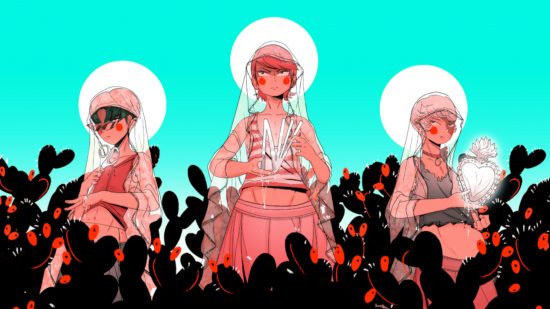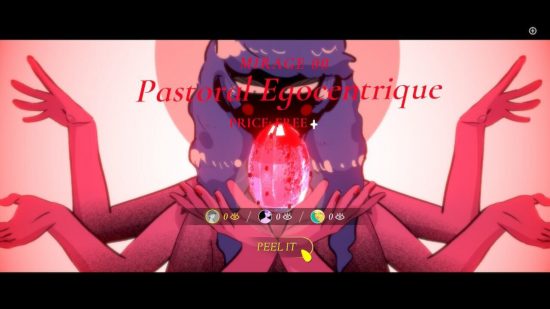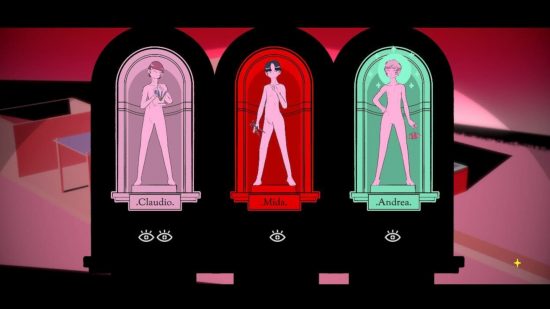Our Verdict
Mediterranea Inferno is a must-play visual novel that explores the intricacies of generational trauma, queer subculture, and our sense of connection in a post-pandemic world with nuance and without shying away from the gorier aspects of the human experience.
When I picked up Mediterranea Inferno, I thought I knew what I was getting into. I’ve played my fair share of visual novels as I tend to gravitate towards interactive storytelling rather than mechanically complex games, and the game’s trailer and description let me know that I was in for the odd scare. But when I say this game has shaken me to my very core, please know that I’m being 100% genuine.
Set in Southern Italy in the summer of 2022, Mediterranea Inferno follows the story of three young, queer men – Claudio, Mida, and Andrea – as they reconnect for a summer holiday after two years of COVID lockdowns and isolation. Pre-pandemic, the trio was known as “I Ragazzi del Sole”, or the Sun Guys, a glowing embodiment of early-20s gay hedonism and freedom in the club scene of Milan. The story follows their attempts to rekindle the spark they once had while battling their individual insecurities, fears, and obsessions.
I have to start by commending the work that the developer Lorenzo Redaelli put into this experience. As well as writing and directing Mediterranea Inferno, he also created the entire game’s soundtrack and hundreds of illustrations for each storyline. The game opens with an author’s note highlighting how much of the game is inspired by his own experience during the pandemic, and that inspiration is abundantly clear as you progress through the story. Redaelli’s emotions and experiences practically bleed out of Mediterranea Inferno’s scenes.
I always find it impressive when a writer can tell a compelling and entertaining story using an intentionally unlikeable protagonist, and Redaelli does this not once, but three times. Claudio, Andrea, and Mida aren’t terrible people, but they’re far from perfect and it’s hard to root for them. This particularly lends itself to the choice-based elements of the story, as I often found myself caught between the boys, unsure who to choose because every option sucked! I ended up choosing Andrea’s route, not because he was any “better” than the other two, but because he reminded me of someone I know in real life. That level of realism in an illustrated visual novel character deserves praise in and of itself.
Each of the Sun Guys has one central concern. For Andrea, it’s his social life. His supposed best friends forgot about him over the course of the pandemic, leaving him lonely and socially anxious, seeking connection in the newly lockdown-free world through casual summer sex and parties. Claudio bears the weight of his family’s legacy, struggling to honor the success of his recently deceased grandfather thanks to his own father’s terrible financial decisions. Mida’s life changed for the better over the pandemic as he rose to fame in the fashion world, but all he cares about is what his peers think of him, and if they will finally take him seriously.
Many queer people like myself know people like each of the Sun Guys. Mediterranea Inferno does an incredible job of capturing a snapshot of the often shallow, petty, and fundamentally insecure lives of young LGBTQ+ people, particularly those who, thanks to more liberal laws, don’t have to spend as much time thinking about their own survival as their forebears or other minority siblings. Redaelli’s writing and art direction offers an effective critique of the ‘scene’ from someone on the inside, while not diminishing the problems faced by people like Claudio, Mida, and Andrea. That takes some real skill, especially to do so in a way that never feels preachy or boring.
The Sun Guys’ vacation isn’t all that it seems right from the get-go, as Claudio encounters a mystical being called Madame who offers him a Mirage, which is essentially an introspective acid trip generated by his subconscious. On the first night of their trip, the boys share a Mirage and Madame tells them that by Ferragosto, the feast celebrating the Assumption of Mary, whichever one of them has experienced four Mirages shall ascend to Heaven. This is where the choice element comes in, as only one of the three can ascend, so you must carefully manage your stock of ‘summer coins’ to purchase Mirages for the right person at the right time.
The game has several endings, including one for each Sun Guy which are equally heart-wrenching, disturbing, and worth experiencing, a neutral ending, and a true ending achieved by collecting eight tarot-like cards throughout the Mirages. I’m fairly certain it’s impossible to get all eight in your first playthrough due to a lack of summer coins, so replayability is not only possible but essential to experience the full story.
After the aforementioned author’s note, the game lists off its various content warnings, so please make sure you read them before playing – things get pretty dark pretty fast. Despite knowing that this story probably wasn’t going to end happily, Mediterranea Inferno still managed to catch me off-guard with a gut-punch of a twist that I’m still reeling from as I write.
The juxtaposition of lavish gay nightlife, traditional Southern Italian Catholicism, and Redaelli’s striking art style and color choices create an atmosphere that’s altogether intoxicating and uncomfortable at the same time. Discomfort isn’t a bad thing – this is the kind of discomfort that I think a lot of privileged European queers (including myself) need to experience, digest, and learn from. That’s why I think Mediterranea Inferno is a must-play in 2024.
While you’re here, check out our picks for the best visual novel games in 2024. Alternatively, if you fancy something a little more involved, we’ve got plenty of great Switch multiplayer games and FPS games to recommend.



